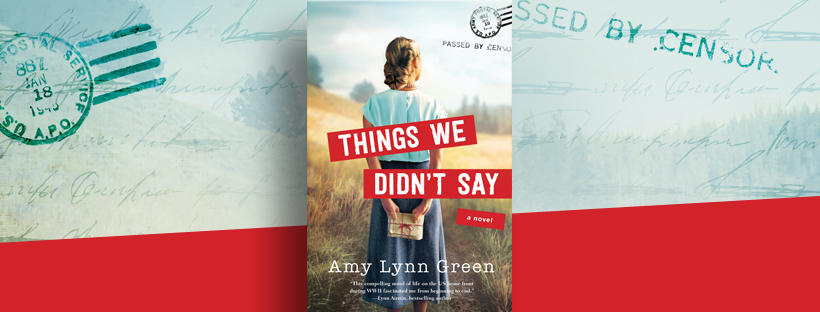Q&A with Historical Fiction Author Amy Lynn Green

-
Things We Didn’t Say is set in Minnesota during World War II. What were some interesting historical facts you learned and integrated into your story after researching?
I got the inspiration for the primary setting of the novel while reading a Minnesota Historical Society publication about the prisoner-of-war camps that were started all over the United States and Canada during the war. More than a dozen were located in Minnesota, where captured German soldiers worked alongside Americans on farms, in factories, and at logging camps. Even more obscure is the fact that the army had a top-secret Military Intelligence Service Language School to teach Japanese to soldiers who would become translators, hostage negotiators, and spies . . . located in Minnesota (first in Savage, then at Fort Snelling). I gave that background to Peter Ito, my main character’s best friend, and based many of his letters on journal entries and interviews with the many Japanese Americans who studied at the school.
-
When it comes to format, why did you choose to write this book as an epistolary novel? What did you find difficult—and most fun—about that process?
There’s an element of delight in epistolary novels, like you’re reading someone else’s mail and making discoveries alongside the characters. Every one of them gets a voice to express things according to their unique perspective, and the reader has the job of sorting out what’s true. Writing Johanna’s letters in particular was an opportunity for me to let loose a witty, dry sense of humor, which I loved. Harder was the challenge of making sure readers had all the puzzle pieces they needed to solve the mystery of how Jo’s experiences in 1944 lead her to be accused of treason.
-
You haven’t always called MN home. What are some of your most favorite things about living here now?
Besides the history of this state, I love the diversity seen in Minnesota’s people and landscapes, the delicious and varied restaurants in the Twin Cities (and other small businesses), and the beautiful changing of seasons, even winter. Until about March, that is, when even a stockpile of tea and warm blankets can’t make me happy to see more snow.
-
What drew you to choose a WWII setting, which you are continuing with your sophomore novel?
Call me crazy, but I’m drawn to times and situations of high drama and conflict. WWII, even on the relatively quiet U.S. home front, had loads of it. There are issues they were dealing with--prejudice, the changing role of the media, how to comprehend and deal with global conflict--that are still highly relevant today. And, after reading books and books of WWII-era mail, I’ll add: They really knew how to craft an engaging letter!
-
What are some of the main themes of Things We Didn’t Say?
As I wrote, questions kept jumping out at me. How do we treat those from groups we dislike or don’t trust--and what does that say about us? Why do we need community most in a time of isolation? How do we honor a country that makes decisions we disagree with? Writing about 1944 in 2018, I had no idea how relevant some of this would be in 2020. I hope readers walk away with a deeper desire to love their neighbor as themselves--and maybe also to write a good letter.